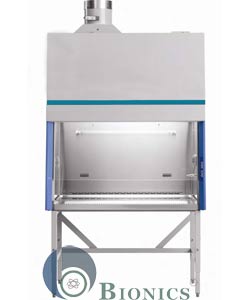Readers Views Point on Class 2 Biosafety Cabinets and Why it is Trending on Social Media
Readers Views Point on Class 2 Biosafety Cabinets and Why it is Trending on Social Media
Blog Article
Enhancing Laboratory Safety with Class 2 Biosafety Cabinets and Microbiological Protection

Maintaining a safe lab environment is crucial in today’s advanced research and clinical setups. Whether it's biotech development, pharmaceutical research, or microbiological analysis, biosafety cabinets are central to preventing cross-contamination and safeguarding personnel.
Of all types, Class 2 cabinets are most commonly used due to their efficiency and versatility. These units are essential for labs working with infectious materials or clinical diagnostics.
Biosafety Cabinets – How They Work and Why They Matter
Biosafety cabinets are airflow-controlled workspaces engineered for microbiological safety. They use HEPA filtration to remove contaminants from incoming and outgoing air.
These units are generally classified into three main types: Class I, II, and III based on containment level. Among these, Class 2 biosafety cabinets are the standard choice for most applications.
Why Class II Cabinets Are the Preferred Choice in Labs
Class 2 Biosafety Cabinets are designed to safeguard three aspects: the operator, the sample, and the environment. They utilise downward laminar airflow within a sealed system.
Air is treated using dual filtration systems to ensure safe circulation and exhaust. These cabinets are ideal for work involving moderate-risk pathogens (BSL-2/3).
Essential Features of Class 2 Safety Cabinets
A Class 2 microbiological safety cabinet includes several critical technologies such as:
• High-efficiency air filters to ensure clean workspace air
• Uniform downward airflow to protect the sample zone
• Negative pressure barriers to prevent leakage
• Built-in UV sterilisation for decontaminating surfaces
• Noise-reducing construction for better working conditions
• Transparent sash or viewing window for easy access and monitoring
These elements support lab workers in maintaining sterile working environments.
Where Class 2 Cabinets Are Used
Class 2 Biosafety Cabinets are commonly used across microbiology, biotechnology, diagnostics, and pharma. They are critical for DNA/RNA extraction, pathogen culture, and molecular assays.
Whether in hospitals or drug manufacturing, these units are essential for clean procedures.
Benefits of Using Class 2 Biosafety Cabinets
Using Class 2 cabinets offers numerous benefits for safety, accuracy, and lab hygiene:
• Reduces the risk of sample cross-contamination and error
• Acts as a barrier between user and biohazard
• Minimises lab contamination and pollution risks
These cabinets support biosafety goals while improving lab productivity.
Cabinet Types and Global Compliance
Top manufacturers design units compliant with major biosafety regulations worldwide. Class 2 units are sub-classified as A1, A2, B1, and B2—with each type offering different air handling systems.
• Type A2: Most commonly used cabinet model
• Type B2: Exhausts 100% of air via ducting; no recirculation
Matching the cabinet type to your process is essential.
Choosing the Right Biosafety Cabinet
Before purchasing, consider:
• The types of agents and materials handled
• Available lab space and utility infrastructure
• Energy consumption and maintenance frequency
• Warranty, training, and certification services
Working with reliable manufacturers provides peace of mind and technical guidance.
Installation and Safety Guidelines
For optimal results:
• Install the cabinet in a draft-free, low-traffic zone
• Ensure annual certification and airflow testing
• Train users in proper techniques and precautions
Operational best practices include:
• Always wear appropriate lab PPE
• Avoid sudden Class 2 Biosafety Cabinets or quick arm movements
• Clean all contact points post-operation
• Treat UV usage as an overnight sterilisation method
Final Thoughts on Class 2 Biosafety Cabinets
Class 2 biosafety cabinets are a cornerstone of any safe, efficient laboratory. They protect workers, secure samples, and copyright environmental standards.
From pathology labs to advanced genetic testing, Class II cabinets maintain sterility in sensitive procedures. When investing in a biosafety cabinet, prioritise compliance, usability, and long-term support—because your research deserves the best protection. Report this page